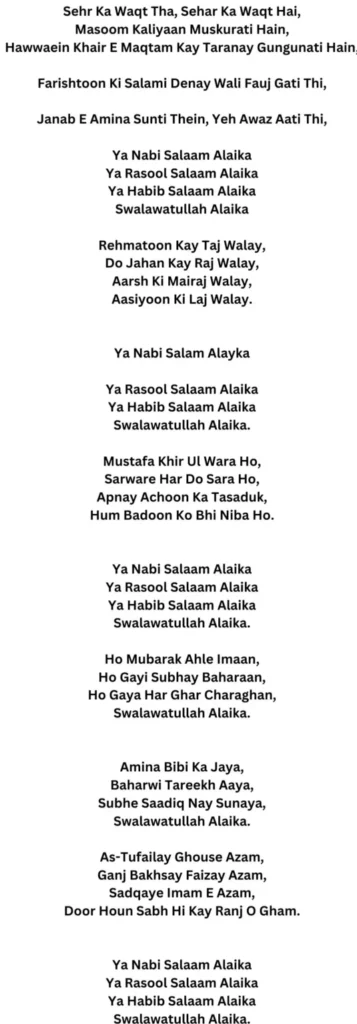Understanding the Lyrics
The Urdu lyrics “Ya Nabi Salaam Alaika” are a heartfelt tribute to the Prophet Muhammad (peace be upon him). The phrase, which translates to “O Prophet, peace be upon you,” is a common salutation used by Muslims to express their love, respect, and reverence for the Messenger of Allah.
Key Themes and Messages
The lyrics of “Ya Nabi Salaam Alaika” highlight several key themes, including:
- Praise and Reverence: The song extols the Prophet’s virtues and attributes, emphasizing his role as a guide, teacher, and intercessor.
- Blessings and Prayers: The lyrics invoke blessings and prayers upon the Prophet, seeking his intercession and protection.
- Gratitude and Love: The song expresses gratitude for the Prophet’s teachings and guidance, and conveys a deep love and admiration for his character.
Historical Context and Significance
The recitation of “Ya Nabi Salaam Alaika” has been a cherished tradition in Islamic culture for centuries. It is often used in prayers, gatherings, and special occasions as a way to connect with the Prophet and seek his blessings. The song’s popularity and significance can be attributed to its powerful message and its ability to evoke feelings of devotion and spiritual connection.
The Impact on Believers
For many Muslims, “Ya Nabi Salaam Alaika” is more than just a song; it is a source of inspiration, comfort, and spiritual nourishment. Reciting or listening to the lyrics can evoke feelings of peace, tranquility, and a sense of closeness to the Prophet. It can also serve as a reminder of the importance of following his teachings and striving to emulate his example.
Conclusion
“Ya Nabi Salaam Alaika” is a timeless expression of love, reverence, and devotion for the Prophet Muhammad. Through its powerful lyrics and uplifting message, the song continues to inspire and connect Muslims around the world. By understanding the deeper meaning behind these words, we can gain a greater appreciation for the Prophet’s legacy and the profound impact he has had on the Islamic faith.
Related post:
| Hasbi rabbi jallallah Naat lyrics in Urdu |
| Aye Sabz Gumbad wale lyrics in Urdu |
| Aye Hasnain Ke Nana Naat Lyrics in Urdu |
| Allah huma sale ala Naat lyrics in Urdu |
Naat ya nabi salam alaika lyrics in urdu video
بِسْمِ اللَّهِ الرَّحْمَنِ الرَّحِيمِ

Rehmaton ke Taj wale | رحمتوں کے تاج والے | Ya nabi salaam alaika | یا نبی ﷺ سلام علیک
issued date:Feb 15, 2023
Naat ya nabi salam alaika lyrics in urdu translation
یا نبی سلام علیک نعت لیرکس ایک بہت ہی اچھے نعت کے لیرکس ہے۔ جو کہ پورے ایشیا میں اپنے لیرکس کی وجہ سے بے حد مشہور ہے۔ نعت میں شاعر نے اپنے بے لوس محبت کو اپنے الفاظ کی شکل میں بیان کیا ہے۔ اس نعت میں شاعر نے حضرت محمد صلی اللہ علیہ وسلم کو کئی صفاتی نام سے پکار کے سلام پیش کیا ہے
اس نعت لیرکس میں شاعر نے شیر کے ہر بند میں . جناب حضرت مصطفی صلی اللہ علیہ وسلم کو اپنے آقا اور خود کو اس کا غلام ظاہر کیا . کہ آپ صلی اللہ علیہ وسلم رحمتوں کے تاج والے ہے. دونوں جہاں کے راج والے ہے۔ نعت لیرکس یا نبی سلام علیکہ میں شاعر الله تعالٰی سے التجا کرتا ہے . کہ آپ صلی اللہ علیہ وسلم کے صدقے سب کے رنج وغم دور ہو. سب پے رحمتوں اور خوشیوں کی آمد ہو۔
FAQs:
This heartwarming “Naat” (prophetic praise) expresses greetings and blessings upon Prophet Muhammad (PBUH). The core phrase translates to “O Prophet, peace be upon you.” While specific lyrics may differ, many renditions feature this line repeatedly, often accompanied by verses describing the Prophet’s virtues and guidance. Exploring online resources can reveal a beautiful tapestry of variations.
The digital world offers a treasure trove of recordings for “Ya Nabi Salam Alaika.” Many Islamic websites provide written lyrics, sometimes with translations, allowing you to learn the words at your own pace. Head to YouTube and discover a multitude of renditions by talented singers. Searching for “Ya Nabi Salam Alaika Naat” or “chant” can lead you to inspiring performances that bring the lyrics to life.
This beautiful phrase holds deep meaning for Muslims. “Ya Nabi” translates to “O Prophet,” showing respect for Prophet Muhammad (PBUH). “Salam Alaika” means “peace be upon you,” reflecting a prayer for Allah’s (SWT) peace to be bestowed upon him. By chanting these words, Muslims express their love and appreciation for the Prophet’s teachings and guidance.




